 Petzlover
Petzlover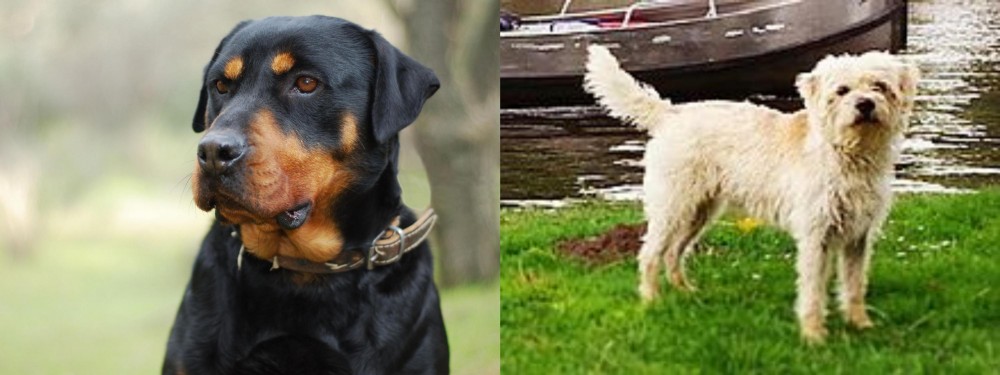 Rottweiler is originated from Germany but Dutch Smoushond is originated from Netherlands. Rottweiler may grow 26 cm / 11 inches higher than Dutch Smoushond. Rottweiler may weigh 49 kg / 109 pounds more than Dutch Smoushond. Rottweiler may live 4 years less than Dutch Smoushond. Rottweiler may have more litter size than Dutch Smoushond. Rottweiler requires Low Maintenance. But Dutch Smoushond requires Moderate Maintenance
Rottweiler is originated from Germany but Dutch Smoushond is originated from Netherlands. Rottweiler may grow 26 cm / 11 inches higher than Dutch Smoushond. Rottweiler may weigh 49 kg / 109 pounds more than Dutch Smoushond. Rottweiler may live 4 years less than Dutch Smoushond. Rottweiler may have more litter size than Dutch Smoushond. Rottweiler requires Low Maintenance. But Dutch Smoushond requires Moderate Maintenance
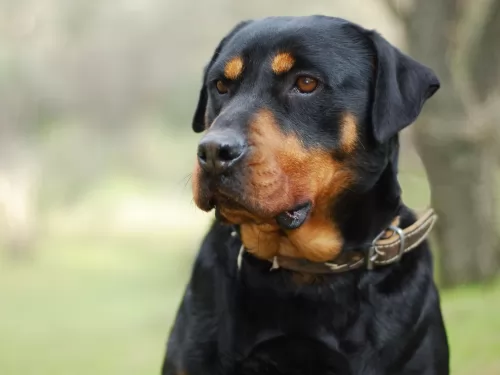 It is beleived to be the Rottweiler has been developed from the Roman cattle dogs. The Roman empire made a camp in a place at Germany in 74 AD. The area was called as 'das Rote Wil' and later as 'Rottweil'. In the middle ages Rottweiler was used in bear hunting and as a cattle dog. In 1899 the International club for Leonbergers and Rottweiler dogs was formed in Germany. In 19th century due to set in of railways the cattle was moved by railways and the need for the breed declined. When the world war was set in there came a heavy demand for police dogs. Rottweilers played a major role in first and second world war.
It is beleived to be the Rottweiler has been developed from the Roman cattle dogs. The Roman empire made a camp in a place at Germany in 74 AD. The area was called as 'das Rote Wil' and later as 'Rottweil'. In the middle ages Rottweiler was used in bear hunting and as a cattle dog. In 1899 the International club for Leonbergers and Rottweiler dogs was formed in Germany. In 19th century due to set in of railways the cattle was moved by railways and the need for the breed declined. When the world war was set in there came a heavy demand for police dogs. Rottweilers played a major role in first and second world war.
In 1921 many German Rottweiler clubs joined together to form ADRK, which is Allgemeiner Deutscher Rottweiler Klub. This is said to be the home club of Rottweiler. American kennel club recognised them in 1931. They become 9th most popular breed in America in 2013.
 The Dutch Smoushond, known also as the Hollandse Smoushond ,Hollandse Herdershond
The Dutch Smoushond, known also as the Hollandse Smoushond ,Hollandse Herdershond
or Dutch Ratter is a small to medium sized dog. The Smoushondenclub was formed in 1905 as it was thought that the breed was dying out and they wanted to register the dog as a purebred breed.
It is believed that the dog’s origins may have to do with the Schnauzer breed. It was in 1973 that a number of breeders looked to reconstruct the breed, using Border Terrier crosses.
Today this rare breed is popular in the Netherlands, but not particularly well known anywhere else. In 2001 it was recognized by the Federation Cynologique Internationale as well as by the United Kennel Club in the United States.
Although the dog was once a skilled ratter, most Dutch Smoushond are kept as companion dogs.
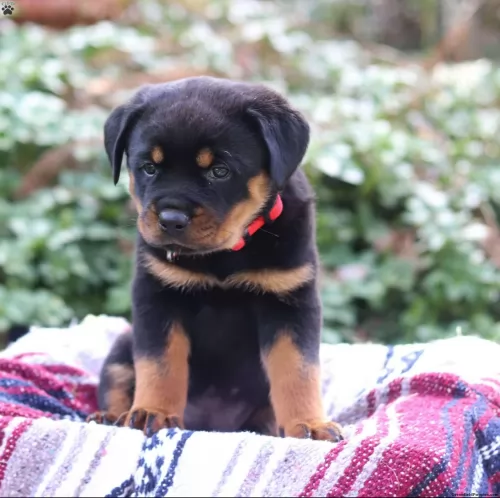 Rottweilers are good natured, obedient and are very much eager to work. They are calm, confident and an excellent watchdog. They will not make friends immediately. Rottweilers can be said as an all purpose dog since they are suitable as companion and watch dog as well. He is good in herding and guarding as genital feature. Rottweiler must be trained from its younger stage and should not be hit while training. They have high energy level and thus they are interested in doing work if properly trained. There are more possibilities of biting the strangers because of watchdog tendency.
Rottweilers are good natured, obedient and are very much eager to work. They are calm, confident and an excellent watchdog. They will not make friends immediately. Rottweilers can be said as an all purpose dog since they are suitable as companion and watch dog as well. He is good in herding and guarding as genital feature. Rottweiler must be trained from its younger stage and should not be hit while training. They have high energy level and thus they are interested in doing work if properly trained. There are more possibilities of biting the strangers because of watchdog tendency.
They are very good in herding sheeps as they have a natural gathering style. They are clever and adjusts the barking sound according to the situation. While herding they used to prove the leadership by selecting the dominant one in the flock and challenging it. If they were made to watch a same flock of cattle regularly, then they will develop a bond with them and will be affectionate with them as long as the cattle obeys its commands.
 The Dutch Smoushond is a small to medium sized dog breed related to the Schnauzer- and Pinscher breed. He stands at about 35 to 43cm at the withers and weighs about 10kg.
The Dutch Smoushond is a small to medium sized dog breed related to the Schnauzer- and Pinscher breed. He stands at about 35 to 43cm at the withers and weighs about 10kg.
He has a rough, shaggy, wiry coat which is waterproof and which is a yellowish or straw color. You’ll notice that the hair around the face is long and fairly straight and forms a beard, eyebrows, and moustache, giving him wise, know-it-all look.
The forelegs are also feathered. He may well give the impression of being ungroomed and untidy with his different length hair. He has floppy ears, the eyes are small and dark, the nose black and the tail is long and feathery, hanging limply when the dog is relaxed.
Easy going, friendly and social, the Dutch Smoushond is a fairly quiet dog, but because he is intelligent and alert, he makes a good watchdog.
When not guarding you, he is cheerful and entertaining. He is an adaptable dog, being able to settle down to life in the city or in the countryside, getting on well with other pets in the home as well as with children.
He is a dog who wants to please, so training him isn’t going to prove difficult. He’ll do well with this training as well as socialization as he becomes obedient, easy-going and relaxed around strangers.
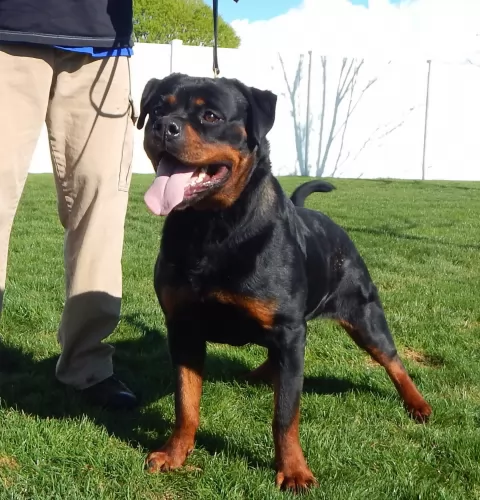 They are friendly with children and enjoy the company with them. But it is not advised to leave them with children without adult supervision.
They are friendly with children and enjoy the company with them. But it is not advised to leave them with children without adult supervision.
Rottweilers do not make friends immediately but take time to know about new people. He is an excellent watchdog. Males are quiet in nature but are watchful and females are more affectionate and obey some more. A good training is required for them to obey your orders.
They are not good for apartment life and thus a fenced back yard will be better for them to play and spend the energy. They require companion and will be happy to walk around with you. Hot weather will be some what better for them when compared with cold.
Rottweilers are easy to train because of their high intelligence. The training should be started in their young stage to have best results. They should not be dominated but treated kindly with understanding. They should be comfortable with the surroundings and people. Giving him a reward for training will make him interested in doing it. If he does a mistake then he should not be hit, so that he may get fear and loss his interest in doing it. Punishments will never work for them but rewarding will make him encouraged. Simple commands such as sit and stand shall be taught to them.
 The Dutch Smoushond, also known as the Dutchie, Dutch Ratter or Dutch Terrier may once have been used as a vermin hunter, but today this terrier dog shares some of the characteristics of the more popular terriers. He may have been a hunter in his day, but more recently he is used as a reliable companion dog.
The Dutch Smoushond, also known as the Dutchie, Dutch Ratter or Dutch Terrier may once have been used as a vermin hunter, but today this terrier dog shares some of the characteristics of the more popular terriers. He may have been a hunter in his day, but more recently he is used as a reliable companion dog.
He tends to be a bit of a barker, particularly when he isn’t getting attention.
He gets on well with other animals in the home as well as with children, but he will need to be trained and socialized. He is lively, friendly and social and is a dog who becomes devoted to his human family.
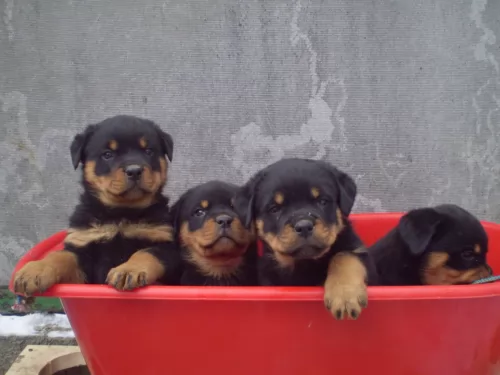 The health issues affecting the eyes of them are Cataract and Progressive Retinal Atropy. Health problems common in their joints are Hip Dysplasia, Elbow Dysplasia and Panosteitis. They also have chances to get circulatory system problems like Aortic Stenosis and Von Willebrand's Disease. Other common health problems in Rottweiler are Bloat and Cancer.
The health issues affecting the eyes of them are Cataract and Progressive Retinal Atropy. Health problems common in their joints are Hip Dysplasia, Elbow Dysplasia and Panosteitis. They also have chances to get circulatory system problems like Aortic Stenosis and Von Willebrand's Disease. Other common health problems in Rottweiler are Bloat and Cancer.
Mostly people think that Rottweilers don't shed but they are short haired dog and sheds more. They are having double coat that is undercoat and topcoat. The undercoat is softer and protects them in winter and topcoat is rougher and visible. It is said that they will shed in spring and winter seasons. Shedding can be reduced by brushing them.
 These dogs are a healthy breed, but nonetheless there are are some health problems that can crop up occasionally.
These dogs are a healthy breed, but nonetheless there are are some health problems that can crop up occasionally.
Ear- and eye infections and joint problems are always a major concern, even in young dogs. Bad diet, old age and being overweight can all contribute to your dog developing joint pain. Joint pain symptoms can include -
difficulty with sitting or lying down
limping or even holding a leg up off the ground
lethargic to take part in any activities
Take your pet to the vet who will examine your pet and perhaps request x-rays.
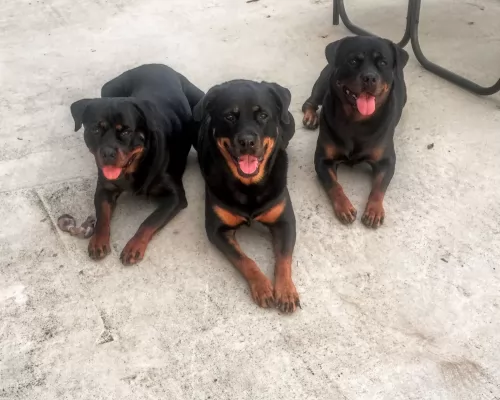 Rottweiler puppies should be given a diet which has protein, carbohydrates and fats. They need different diets in their growing stages. They can be given chicken with bones and vegetables for 4 days in a week. Beef with vegetables can also be given. When feeding them red meat a raw meaty bone can also be included. Fish oil can be given such that starting with 1000 mg and making it to 3000 mg in a time of two weeks.
Rottweiler puppies should be given a diet which has protein, carbohydrates and fats. They need different diets in their growing stages. They can be given chicken with bones and vegetables for 4 days in a week. Beef with vegetables can also be given. When feeding them red meat a raw meaty bone can also be included. Fish oil can be given such that starting with 1000 mg and making it to 3000 mg in a time of two weeks.
High calories of protein should be provided to them to meet their energy requirements. While buying commercial food it should be checked for the main ingredient to be meat. Protein levels should be more from animals than vegetables. High quality dairy products should be included. Food should not have low quality flavours and preservatives. Healthy fat is necessary for their skin and coat. If these fats are not provided it will cause dandruff and itchy skin.
Brushing them weekly once is recommended for their coat and skin. Buying the puppy from reputable breeder will be better. Vaccinations and preventive medicines should be given on right time. Spaying and Neutering should be done to avoid unwanted pregnancy. High quality diet should be maintained. Making them to bath once in a week is advisable. Nails should be trimmed once in every two weeks.
Rottweilers like to chase something and Laser pointer will be a good game for them. It will make them busy and also entertain us. But it should be on a limit and they should not get bored. A treat or toy can be hided and they can be made to find it. A bottle should be filled with water and frozen. The frozen bottle can be given to them for playing. In summer time it will make them very happy to play with it. A ball or toy can be thrown and they can be made to fetch it. Walking them is also a good exercise.
 The Dutch Smoushond is basically an easy care breed, and it won’t do to try and tame the coat as the dog has a naturally unkempt look.
The Dutch Smoushond is basically an easy care breed, and it won’t do to try and tame the coat as the dog has a naturally unkempt look.
You can brush him twice a week to keep the coat free of matting and to remove loose hairs. The Dutch Smoushond may require the hair being plucked and a professional groomer can do this.
At the same time, the groomer can remove excess hair from the ears and also clean your dog’s teeth. This is of critical importance as bad teeth can lead to a host of health problems.
Get into the habit of brushing your pet’s teeth 2 or 3 times a week, making use of special pet approved toothbrush and toothpaste.